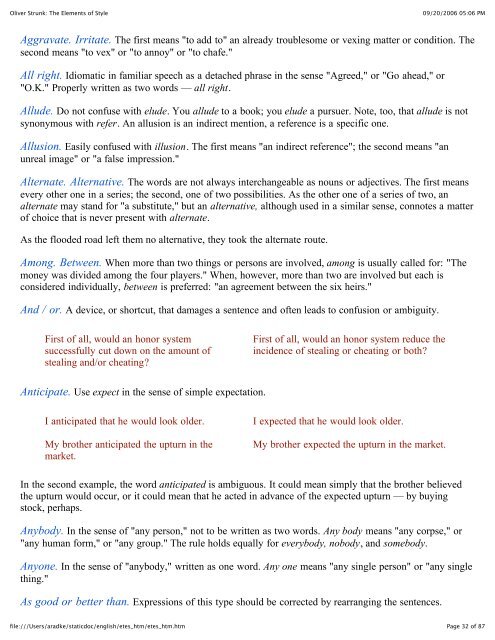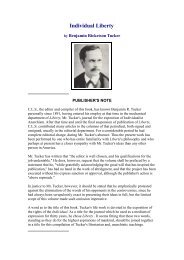Oliver Strunk: The Elements of Style - Evernote
Oliver Strunk: The Elements of Style - Evernote
Oliver Strunk: The Elements of Style - Evernote
Create successful ePaper yourself
Turn your PDF publications into a flip-book with our unique Google optimized e-Paper software.
<strong>Oliver</strong> <strong>Strunk</strong>: <strong>The</strong> <strong>Elements</strong> <strong>of</strong> <strong>Style</strong><br />
09/20/2006 05:06 PM<br />
Aggravate. Irritate. <strong>The</strong> first means "to add to" an already troublesome or vexing matter or condition. <strong>The</strong><br />
second means "to vex" or "to annoy" or "to chafe."<br />
All right. Idiomatic in familiar speech as a detached phrase in the sense "Agreed," or "Go ahead," or<br />
"O.K." Properly written as two words — all right.<br />
Allude. Do not confuse with elude. You allude to a book; you elude a pursuer. Note, too, that allude is not<br />
synonymous with refer. An allusion is an indirect mention, a reference is a specific one.<br />
Allusion. Easily confused with illusion. <strong>The</strong> first means "an indirect reference"; the second means "an<br />
unreal image" or "a false impression."<br />
Alternate. Alternative. <strong>The</strong> words are not always interchangeable as nouns or adjectives. <strong>The</strong> first means<br />
every other one in a series; the second, one <strong>of</strong> two possibilities. As the other one <strong>of</strong> a series <strong>of</strong> two, an<br />
alternate may stand for "a substitute," but an alternative, although used in a similar sense, connotes a matter<br />
<strong>of</strong> choice that is never present with alternate.<br />
As the flooded road left them no alternative, they took the alternate route.<br />
Among. Between. When more than two things or persons are involved, among is usually called for: "<strong>The</strong><br />
money was divided among the four players." When, however, more than two are involved but each is<br />
considered individually, between is preferred: "an agreement between the six heirs."<br />
And / or. A device, or shortcut, that damages a sentence and <strong>of</strong>ten leads to confusion or ambiguity.<br />
First <strong>of</strong> all, would an honor system<br />
successfully cut down on the amount <strong>of</strong><br />
stealing and/or cheating?<br />
Anticipate. Use expect in the sense <strong>of</strong> simple expectation.<br />
file:///Users/aradke/staticdoc/english/etes_htm/etes_htm.htm<br />
First <strong>of</strong> all, would an honor system reduce the<br />
incidence <strong>of</strong> stealing or cheating or both?<br />
I anticipated that he would look older. I expected that he would look older.<br />
My brother anticipated the upturn in the<br />
market.<br />
My brother expected the upturn in the market.<br />
In the second example, the word anticipated is ambiguous. It could mean simply that the brother believed<br />
the upturn would occur, or it could mean that he acted in advance <strong>of</strong> the expected upturn — by buying<br />
stock, perhaps.<br />
Anybody. In the sense <strong>of</strong> "any person," not to be written as two words. Any body means "any corpse," or<br />
"any human form," or "any group." <strong>The</strong> rule holds equally for everybody, nobody, and somebody.<br />
Anyone. In the sense <strong>of</strong> "anybody," written as one word. Any one means "any single person" or "any single<br />
thing."<br />
As good or better than. Expressions <strong>of</strong> this type should be corrected by rearranging the sentences.<br />
Page 32 <strong>of</strong> 87

















